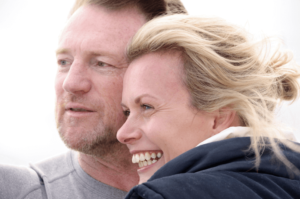This blog shares 4 ways on how to be vulnerable. It’s not an easy thing to do, especially if you have been shamed or discouraged from sharing your feelings in the past. Whether it was in your childhood, adolescence, or adulthood, you experienced rejection, abandonment, or hurt feelings when opening up.
As a result, you refrain from being open with others. You could be struggling with difficult feelings of sadness, frustration, grief – or even experiencing positive feelings like happiness or excitement. However, you hesitate to share with others out of a fear from experiencing similar responses that did not feel good to you.
When we practice vulnerability with others whom we trust, we provide ourselves with opportunities to mend or heal wounds we carry with us. We can express ourselves fully, feel comfortable talking about our experiences, and feel safe in knowing that it’s okay to be vulnerable with the right people.
The four ways we include for how to be vulnerable include: 1) Agree that you are worthy of being able to be vulnerable. 2) Avoid anticipating others’ responses or reactions. 3) Go slow with it. 4) Vocalize your feelings or needs.
Trauma therapy helps you understand the connections to your present day self, to experiences you had as a child, teen, or adult. Make sure to check out our blog on 5 Ways to Connect with Your Inner Child, as that can be healing.
How to Be Vulnerable: Agree that you are worthy of being able to be vulnerable

Acknowledging and accepting that you are worthy of being able to be vulnerable is the first step. It is likely hard for you to feel this way, if you have thoughts about how undeserving you are of anything good. You believe that you’re hard to love, hard to deal with, and overall just have a lot of shame baggage on your shoulders.
However, everyday is a new day, and a new opportunity to continue growing into the person you want to be. You can make changes moving forward to a healthier, more positive version of yourself. Perhaps you carry shame or guilt from past behavior or experiences.
While it is good to hold yourself accountable and responsible for wrongdoings, loosen the grip on yourself as well. It’s okay to forgive yourself, and move forward to find ways to grow from mistakes.
You want to open up more to your family, friends, partners, colleagues, or even yourself. Confirm with the other person that you can open up about some topics, and if they are in the right headspace to listen with you. Once you have the green light, consider dipping your feet in the water of sharing.
Regardless of what you have learned in your childhood or in relationships, your feelings do matter. It’s not healthy, or okay, for you to minimize or brush them off. Especially if it’s for someone else’s benefit. Remind yourself of your worth, and work to heal from past negative belief systems.
LGBTQ+ counseling provides affirmative support for members of the LGBTQIA+ community. Make sure to read our blog on What is LGBTQIA+ Affirming Therapy for more information on what you or a loved one can expect.
How to Be Vulnerable: Avoid anticipating others’ responses or reactions

You hesitate to open up to someone out of anticipating their response or reaction. For example, you have something you want to share that you’re not too proud of. It could be a past behavior or current event that brings you shame or embarrassment to discuss.
It could be that you worry about what others will think of you after discussing this. In an attempt to avoid being open and vulnerable, you may want to portray yourself as someone different from who you really are. This could be for the beginning of a new relationship, for example, if your last relationship was not healthy.
In your last relationship, when you asked for reassurance or validation from your partner, they did not give it to you and may have called you dramatic or annoying. Now in this present relationship, you hesitate to check in with your partner about how they’re feeling with the pace.
This could also be when you were a child, and knew your parents would not really blink an eye at your accomplishments. They may have shown little interest or praise, and brushed it off as not a big deal or that you could’ve done better. With your current achievements, you also feel that they are not worthy of bringing to someone’s attention.
These examples, and hundreds of others, could stop you from being vulnerable in the first place. Release anxious feelings or beliefs about opening up to others, and let it unfold before you.
Anxiety therapy can help you gain personal insight into hesitations around opening up and expressing yourself. Make sure to read our blog on 5 Ways to Quickly Ground Yourself, as these are great tools for anxiety or panic attacks!
How to Be Vulnerable: Go slow with it

Open up at a comfortable pace, and share what feels right to you in the moment. Don’t force yourself to share things until you feel ready, either. You want to put your comfort levels first, and make sure you feel safe in being vulnerable with someone.
You may have a natural inclination to over-share some things, and then feel regret or shame for doing that. By going slow, you don’t need to be open about just one detail per time you talk with someone. You just want to focus on sharing an appropriate amount of information, and that the person on the receiving end is able to be present and listen to you as well.
Make sure you are also in an environment where you would not be rushed, or have to stop yourself frequently. In all, don’t rush yourself to speak on anything. Don’t feel the need to let it all out at once. You decide when and where the conversation takes place!
Trauma therapy for PTSD works with individuals through a trauma-informed lens. Our licensed therapists at New Leaf are both competent and experienced. Make sure to read our blog on How to Be Patient with Yourself!
How to Be Vulnerable: Vocalize your feelings or needs

You may know someone you’re opening up to well enough to guess their responses or reactions. For example, you have a family member or friend that has intentions to show you tough love, but can come off as a bit cold or dismissive.
Communicate your feelings or needs with others, and how they can be of better support while you’re being vulnerable. You can let others know that you do not want them to share their opinion on the situation or provide you with feedback. Instead, you just want them to listen to you, and help you feel heard.
One example is if you notice feeling anxious in the midst of sharing. Tell others how you are feeling, and what you will need to feel better. This could look like communicating that you’re starting to feel overwhelmed, and need to take a moment to yourself by stepping away.
Being vulnerable can be difficult. You may feel that you don’t even have the words to express yourself to begin with. This could be due to anxiety, past trauma, or other issues that cause you to feel closed off.
In-person therapy in Simi Valley is ideal for those seeking a separate, safe space from their home. Check out our blog on Online Therapy or In Office Therapy to understand what format is best for you.
By seeking out support, you can begin your journey to feeling relief. You don’t have to go through finding the right level of support alone, either. Make sure to check out our blog on How to Validate Yourself!
Consider calling our therapy group at (805) 774-1506 for a free consultation! Make sure to check out our blog on How to Sit with Uncomfortable Feelings.
Seek out a validating, safe environment with us today. We will help you get to where you want to be. Our therapists provide trauma therapy, teen therapy, individual adult therapy, LGBTQIA+ therapy, anxiety therapy, depression therapy, family therapy, and more in-office in Simi Valley, CA.
 Monday – Friday: 9:00 am to 6:00 pm
Monday – Friday: 9:00 am to 6:00 pm 2489 Tapo St. Suite B
2489 Tapo St. Suite B  805-774-1506
805-774-1506